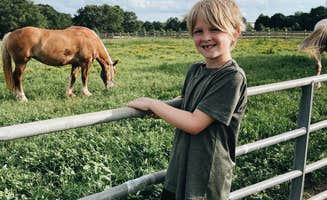Equestrian camping opportunities near Winder, Georgia span across 45,000 acres of forests and pastureland throughout the region. The area's moderate southeastern climate supports year-round camping with average summer highs of 89°F and winter lows rarely dropping below 30°F. The gently rolling terrain ranges from 900-1,200 feet in elevation, creating varied riding experiences through hardwood forests and alongside numerous water features.
What to do
Trail riding at Watson Mill Bridge State Park: Located approximately 37 miles east of Winder, riders can explore multiple trail options ranging from beginner to advanced difficulty levels. The park's signature 229-foot covered bridge provides a unique riding landmark. "There are seven miles of hiking trails, five miles of bike trails, canoe rentals, and we saw several people fishing," notes reviewer Lee D., highlighting the diverse activities available beyond horseback riding.
Water activities at Hard Labor Creek State Park: This park offers equestrians the chance to cool off after riding with lake access points specifically designated for horses. "The park is located on Lake Lanier with plenty of opportunities for fishing, swimming and boating! There's even a fish cleaning station," explains reviewer George & Patty C. The park maintains separate swimming areas for humans, with dedicated shoreline access for horses.
Heritage tours through historic sites: Several equestrian trails connect to 19th-century mill sites and historic homesteads. "You will pass the ruins of an old hydro power plant," mentions Rebecca L. at Watson Mill Bridge State Park. These self-guided routes include informational markers explaining the agricultural history of the region and how horses contributed to local development.
What campers like
Private equestrian sites at Big Country Camping: Located approximately 35 miles south of Winder, this campground provides dedicated areas for riders with trailer parking and grazing areas. "Very quiet and peaceful location. I had a full hookup site. Owners helped me get situated," shares James, emphasizing the campground's welcoming atmosphere for equestrians.
Wooded horse-friendly terrain at Hard Labor Creek State Park: Riders appreciate the extensive trail system with minimal elevation changes, making it accessible for most horse experience levels. "We were able to walk off of the back of our site and onto the trail system, which is perfect because we are avid hikers," notes George & Patty C., highlighting the direct trail access that benefits both hikers and riders.
Facilities designed for equestrians: "There are hiking trails, geocaches, a beach area, picnic shelters, cottages and a brand new equestrian trail system!" explains a reviewer about Don Carter State Park. Most horse campgrounds in the region feature specialized amenities like hitching posts, water troughs, and manure disposal areas that recreational riders find essential during overnight stays.
What you should know
Reservation requirements for equestrian sites: Most dedicated horse campgrounds require advance bookings, especially during spring and fall riding seasons. At Don Carter State Park, a reviewer advises, "If you are wanting to check out a rental of a canoe make sure you call in advance, these are only available during certain times." The same principle applies to equestrian sites, which often have specific check-in procedures.
Weather considerations: The clay-based soil in many horse camping areas can become problematic after rain. "This site is best enjoyed in dry weather," warns Rebecca L. about a primitive campsite, adding that "Getting back up if it had been raining would probably not be guaranteed, so watch the weather carefully." Trailer access is particularly affected by wet conditions.
Variable cell service: Communication can be inconsistent throughout horse camping areas. "Cell phone service is very spotty in the park but that is alright with us, camping is about getting AWAY and enjoying the outdoors," mentions George & Patty C. Emergency contact protocols typically involve contacting park rangers, as mobile coverage remains limited in canyon areas and dense forest sections.
Tips for camping with families
Child-friendly horse experiences: Several campgrounds near Winder offer supervised riding opportunities for younger visitors. At Big Country Camping, reviewer Cara notes the family-oriented atmosphere: "Small, family owned campground in a rural area has a comforting, relaxing atmosphere where you feel like family." Many sites provide introductory riding lessons with ponies for children under 10.
Water features for cooling off: Summer camping benefits from accessible swimming options after riding activities. "It was beautiful! I pulled in late afternoon, deer were grazing in the primitive camp zones... I took a dip in the cool waters and though they were not a clear blue they were clear and I could see to the bottom," describes Crystal C. about Don Carter State Park's swimming areas.
Educational programs: "We went to a ranger program on raptors on Saturday which was interesting," mentions Joel R., highlighting the supplemental activities available at many equestrian campgrounds. These programs typically include demonstrations of historical riding techniques and information about local wildlife that horses might encounter on trails.
Tips from RVers
RV site considerations at horse campgrounds: Many equestrian facilities have specific requirements for rigs with horse trailers. "Our campsite was a tad bit small for our camper, large campers like motorhomes or fifth-wheels will not fit," cautions Cameron G. about Don Carter State Park. Sites specifically designed for horse trailers typically provide pull-through access with additional parking space.
Hook-up availability varies significantly: Not all equestrian campsites offer full connections. At Watson Mill Bridge State Park, "Only 30A power here so we had to watch what we were running electrically. They did have 2 30A outlets but at this time we did not have the double 30 to 50 amp adapter," explains Paul Z., highlighting the need to prepare for limited electrical capacity.
Separation between camping areas: "The equestrian campground features all paved campsites so it would be tough camping in a tent (no way to stake your tent)," notes a reviewer about specialized RV areas at horse campgrounds. Many facilities maintain distinct camping zones for different user types, sometimes located several miles apart within the same property.


